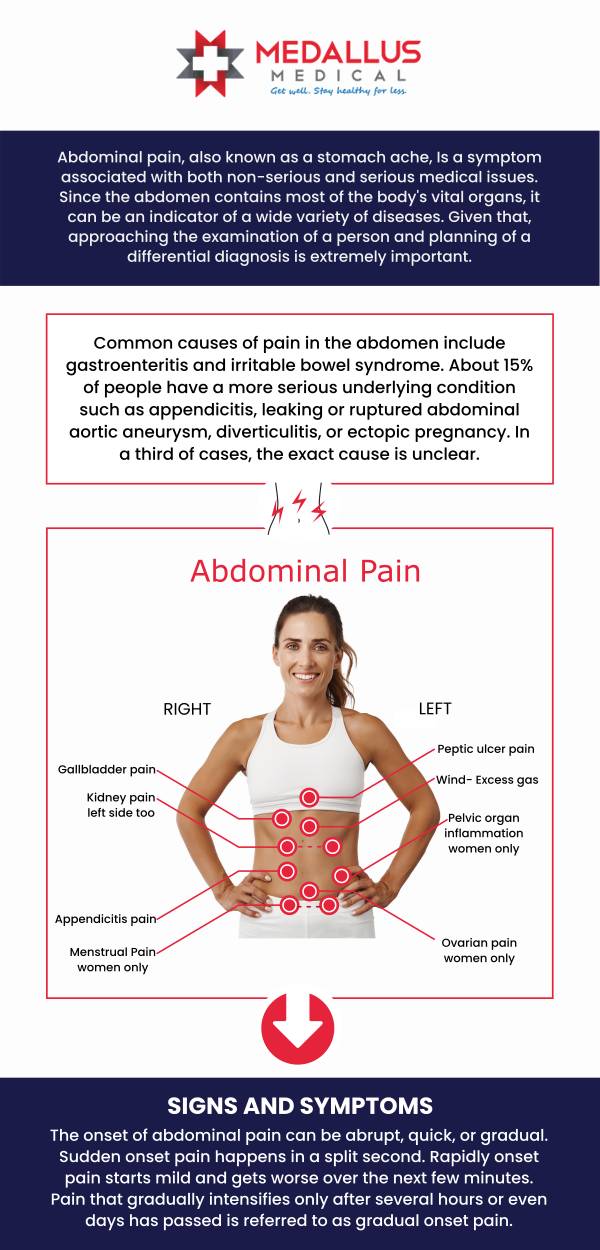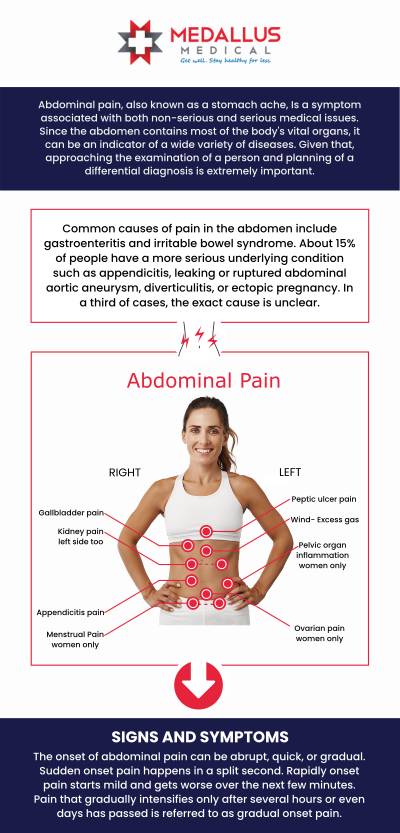What Causes Lower Abdominal Pain in Women?
Lower abdominal pain in women can be caused by various factors, including menstrual cramps, ovarian cysts, urinary tract infections, or more serious conditions like endometriosis. At Medallus Urgent Care, our team provides prompt evaluations to identify the cause and offer effective treatment to relieve discomfort. For more information, please contact us or see our business hours online. We have convenient locations to serve you in Jamestown ND, Fargo ND, and Mandan, ND.


Table of Contents:
How can food intolerances or allergies cause pain in the lower abdomen?
What are the signs and symptoms of a kidney stone, and can the pain radiate to the lower abdomen?
Can muscle strains or a pulled muscle cause pain in the lower abdominal area?
How can a sexually transmitted infection (STI) lead to lower abdominal pain in women?
Food intolerances and allergies can both cause lower abdominal pain, but they do so in different ways. At Medallus Urgent Care, we frequently see patients experiencing digestive discomfort after eating, and it’s important to understand the difference between these two conditions so you know when to seek medical attention.
Food Intolerances:
A common example is lactose intolerance, where the digestive system lacks the enzyme needed to break down lactose—a sugar found in milk and dairy products. Without this enzyme, undigested lactose moves into the colon, where it is broken down by bacteria, producing gas and causing bloating, cramping, and lower abdominal pain.
Food Allergies:
Unlike intolerances, food allergies involve the immune system. When someone with a food allergy eats a triggering food (like peanuts or shellfish), their immune system reacts and releases chemicals such as histamine. This can cause inflammation in the digestive tract, leading to pain, nausea, vomiting, diarrhea, and sometimes more serious symptoms.
Both food intolerances and allergies can disrupt normal digestion and cause a range of symptoms, including abdominal pain, changes in bowel movements, bloating, and swelling. If you notice these symptoms after eating certain foods—or if you experience severe pain, persistent vomiting, trouble breathing, or swelling—it’s important to seek prompt medical evaluation.
Kidney stones are a common condition that can lead to a range of uncomfortable and sometimes severe symptoms. We frequently see patients experiencing the intense pain caused by kidney stones and are equipped to help you manage these symptoms and get the right care.
One of the hallmark symptoms of a kidney stone is severe, cramping pain that usually starts in the back or side, just below the ribs. This pain—known as renal colic—can come in waves and may shift location as the stone moves through your urinary tract. It often radiates to the lower abdomen or groin, which is a key sign that the stone is traveling from the kidney toward the bladder.
Other symptoms you might experience include:
● Blood in your urine (making it look pink, red, or brown)
● Frequent or urgent need to urinate
● Burning sensation during urination
● Nausea and vomiting
● Fever and chills (which may indicate an infection requiring immediate attention)
If you’re experiencing any of these symptoms, especially severe pain, blood in your urine, or signs of infection, visit Medallus Urgent Care right away. Our experienced providers can evaluate your symptoms, perform necessary tests, and help relieve your discomfort. Rapid care is important—not only for your comfort, but also to prevent complications, particularly if a urinary tract infection is present.
Your health is our priority. Don’t hesitate to walk in or contact us if you suspect a kidney stone or are suffering from severe abdominal or urinary pain. We’re here to help you feel better, faster.
Yes, muscle strains—or a “pulled muscle”—are a common cause of pain in the lower abdominal area. The abdominal wall is made up of several important muscles, such as the rectus abdominis, obliques, and transversus abdominis. Muscle strain can happen when these muscles are overstretched or torn, often due to sudden movements, heavy lifting, intense activity, or improper exercise technique.
Symptoms of an abdominal muscle strain include localized pain (which may be sharp or aching), especially when bending, twisting, coughing, or sitting up. You might also notice swelling, bruising, or muscle weakness, and the pain can worsen with activity or pressure on the area.
It’s important to distinguish muscle strains from other causes of lower abdominal pain—such as digestive, urinary, or reproductive issues—since these conditions may need different treatments. Our experienced providers can help determine the source of your pain and ensure you get the right treatment. If your pain is severe, ongoing, or accompanied by symptoms like fever, vomiting, or blood in urine or stool, it’s important to seek prompt medical evaluation to rule out more serious conditions.
At Medallus Urgent Care, we understand that lower abdominal pain in women can be concerning, especially when it’s persistent or severe. One common but often overlooked cause of lower abdominal pain is a sexually transmitted infection (STI).
STIs such as chlamydia and gonorrhea can ascend from the vagina and cervix into the upper reproductive organs, leading to a serious condition called pelvic inflammatory disease (PID). PID causes inflammation of the uterus, fallopian tubes, and sometimes the ovaries, resulting in pain that may worsen with movement, intercourse, or during menstruation. If left untreated, these infections can cause scar tissue, chronic pelvic pain, and even affect fertility.
Other complications from untreated STIs include cervicitis (infection of the cervix) and endometritis (infection of the inner lining of the uterus), both of which can also contribute to lower abdominal discomfort.
If you are experiencing unexplained lower abdominal pain, especially if you are at risk for STIs, timely diagnosis and treatment are essential. At Medallus Urgent Care, our experienced providers offer:
● Confidential STI testing and evaluation
● Prompt diagnosis of pelvic pain and related symptoms
● Effective, evidence based treatment plans
● Education and resources for sexual health
Remember, early treatment can prevent complications and long-term health problems. If you have lower abdominal pain or other symptoms of an STI, visit your nearest Medallus Urgent Care location for compassionate, expert care. For more information, please contact us or see our business hours online. We serve patients from Jamestown ND, Valley City ND, Devils Lake ND, Fargo ND, West Fargo ND, Moorhead MN, Mapleton ND, Horace ND, Mandan ND, Bismarck ND, Lincoln ND, and surrounding areas.





